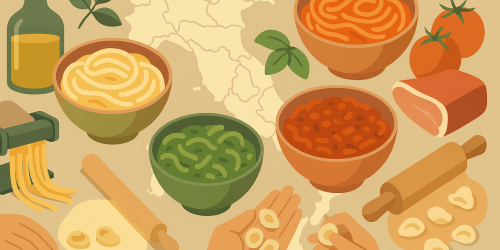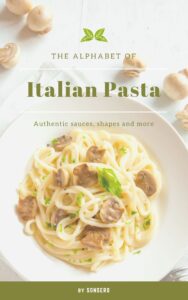SUMMARY
- Explores Italy’s rich pasta traditions and the artistry of pasta-making.
- Features authentic pasta sauce recipes with easy-to-follow instructions and curated wine pairings.
- Highlights a variety of traditional pasta shapes and their regional connections.
- Emphasises authenticity and simplicity, making it accessible for cooks of all skill levels.
- Encourages experimentation with creative combinations while celebrating regional ingredients and cooking methods.
REVIEW
The Alphabet of Italian Pasta by Sonsero is a captivating culinary exploration that transforms pasta from a simple meal into a rich cultural experience.
This remarkable cookbook takes readers on an extraordinary journey through Italy’s pasta landscape, offering more than just recipes but a deep dive into the soul of Italian cuisine. The book has resonated profoundly with food enthusiasts and home cooks by demystifying complex pasta traditions and making them accessible to everyone. Its impact stems from the way it connects readers not just to cooking techniques, but to the cultural heritage behind each pasta shape and sauce.
The book meticulously covers an impressive range of pasta sauces, from the fiery Arrabbiata to the creamy Alfredo, providing detailed instructions and expert tips that empower even novice cooks. Each recipe is carefully crafted to represent its regional origins, ensuring authenticity in every preparation. Beyond sauces, Sonsero explores the fascinating world of pasta shapes, explaining how each type— from delicate Agnolotti to robust Rigatoni—carries its cultural significance. The book brilliantly illustrates how pasta is more than food; it’s a narrative of regional identity, tradition, and culinary innovation.
What makes The Alphabet of Italian Pasta truly special is its ability to transform cooking from a mere task into a creative experience. By blending practical guidance with cultural insights, Sonsero has created a cookbook that educates, inspires, and celebrates the rich tapestry of Italian gastronomy.

IMPROVES
- Cultural Awareness: Deepens understanding of regional Italian pasta traditions, connecting readers to the rich culinary heritage of different Italian regions.
- Creativity and Imagination: Encourages culinary experimentation by exploring diverse pasta shapes and sauce pairings, inspiring readers to develop their unique cooking style.
- Professional Development: Provides comprehensive cooking techniques and expert tips that enhance culinary skills and knowledge for both amateur and experienced cooks.
- Analytical Thinking: Teaches a systematic approach to understanding pasta types, sauce combinations, and cooking methods through structured recipe guidance.
- Quality of Life: Offers stress relief and personal satisfaction through learning authentic cooking techniques and experiencing the joy of preparing traditional Italian cuisine.
WELLBEING
- Expanded Palate: Discover diverse Italian pasta shapes and authentic sauce pairings that encourage culinary exploration and expand your culinary knowledge.
- Awareness of Culture: Gain insights into regional pasta traditions and understand how each type of pasta is deeply connected to its cultural heritage and local ingredients.
- Improved Nutrition: Discover authentic, traditional cooking methods that emphasise fresh, regional ingredients and balanced meal preparation.
- Social Connection: Develop skills to create traditional Italian dishes that can be shared with family and friends, fostering a sense of community through shared dining experiences.
- Health Literacy: Understand the importance of ingredient quality, cooking techniques, and balanced meal composition through comprehensive pasta recipe guidance.
REFERENCES
- “Pasta-Making Process: A Narrative Review of the Relationship between Process Variables and Pasta Quality“, Bresciani, A., Pagani, M.A. (2022).
- Tebben, M. (2017). “Semiotics of Sauce: National Identity and Naming of Pasta Sauces“
- “Pastamarkers 2: Pasta Sauce Colourmaps for Your Flavorful Data”
- International Pasta Organisation. “Pasta: The Story of a Universal Food”
- UNESCO. “Mediterranean Diet: Intangible Cultural Heritage”

